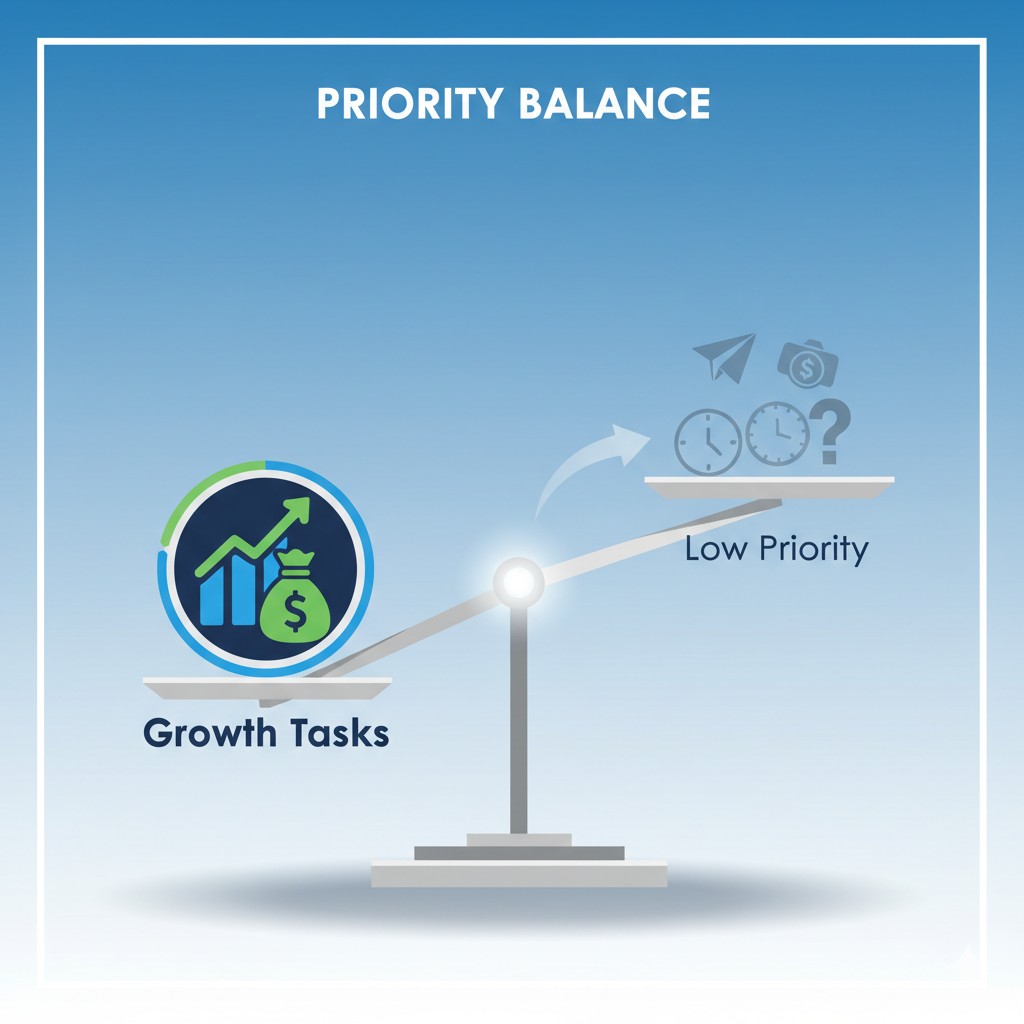Key Takeaways: Get Your Time Back
Being an entrepreneur, its like juggling chainsaws while riding a unicycle, right? Time just vanishes. These Time Management Hacks ain't your usual corporate fluff. They're built for the messy reality of building something from scratch.
- Anti-Schedule: Don't plan minutes, plan types of work (Hack 1).
- Delegate Smart: Let go of tasks, even small ones (Hack 2).
- Two-Minute Start: Use 2 minutes to kickstart big jobs (Hack 3).
- Strategic Delay: Put off unimportant stuff on purpose (Hack 4).
- Communication Walls: Control when messages get your attention (Hack 5).
Why Your Old Time Tricks Don't Work Here
Ever wonder why them Time Management Hacks from your old job just fall flat now? Simple. Being an entrepreneur is a different beast altogether. It's not just a job – it's like five jobs rolled into one, then set on fire. Most days, anyway. You're the CEO, the marketing department, the sales guy, the janitor, maybe even the therapist for your own stressed-out brain. Trying to stick to a rigid, minute-by-minute schedule someone cooked up for a predictable office environment? Good luck with that. It's like trying to paint a masterpiece during an earthquake. The ground under your feet is always shifting:
- A big client calls with an emergency.
- A supplier messes up.
- That brilliant idea hits you at 3 AM.
Your carefully planned day? Poof. Gone by 9:15 AM.
This constant chaos demands a different approach. The core ideas of Business Management still apply – you need structure, you need goals – but how you manage your time needs to be fluid, adaptable. Resilient, kinda like you have to be. I remember trying to use a super-detailed planner when I first started my consultancy. Spent an hour every Sunday night mapping out the week. Felt real productive. By Tuesday afternoon, it was useless. Scribbled over, ignored. Made me feel worse, actually, like I was failing at planning on top of everything else.
The real trick isn't forcing your wild entrepreneurial life into a neat little box. Its about building a flexible cage, one that can handle the bumps and give you space to breathe, and pounce on opportunities when they show up unexpected. Forget the rigid timetables – you need frameworks that bend, not break. We gotta embrace the madness, just a little bit, and find ways to carve out focus within it. That's what these Time Management Hacks are about. They acknowledge the chaos and give you tools to navigate it, not pretend it doesn't exist. Its a mental shift as much as anything.
A Typical Entrepreneur's Time Allocation
- 25% Strategic Work
- 25% Client/Ops
- 15% Marketing
- 25% Admin & Email
- 10% Reactive/Fires
Hack 1: Batching Brain Power – The Anti-Schedule

Right, so forget scheduling every single task down to the minute. That road leads to frustration for us lot. Instead, try this: block out chunks of time for types of work. Call it the ‘anti-schedule'. Sounds weird? Maybe. Works? Definitely. Your brain hates switching gears constantly. Jumping from writing a proposal to answering emails to dealing with a tech issue then back to the proposal… it kills your focus. Each switch costs you time and mental energy. So, batch similar stuff together.
Here's how it might look, just an example, mind you:
- Mornings (say, 8 AM – 11 AM): Deep Work. This is for the heavy lifting. Strategy, writing, coding, product development. Whatever needs your full concentration. No emails. No calls. No social media notifications pinging away. Protect this time like its gold, 'cause it pretty much is.
- Late Morning (11 AM – 12 PM): Communication Catch-up. Deal with important emails. Make necessary calls. Quick check-ins.
- Afternoon (1 PM – 3 PM): Meetings & Errands. If you gotta have meetings (internal or external), or run business-related errands, try to cluster them here.
- Late Afternoon (3 PM – 5 PM): Admin & Planning. Less demanding stuff. Invoicing, paying bills, planning tomorrow, clearing out the inbox again.
See? Its not about what specific task you do at 9:05 AM. Its about being in ‘Deep Work Mode' or ‘Communication Mode'. The actual tasks slot into the appropriate block based on urgency and importance that day. This needs a bit of discipline, sure. And it feels strange at first. But the payoff in reduced mental friction and increased output is huge.
Think of it like good Project Management. You group related phases or tasks in a project, right? This is just applying that logic to your daily grind. It keeps things organised, even when the specific tasks feel like they're coming at you from all directions. You need flexibility within the blocks, of course. Some days Deep Work might be shorter, Communication longer. That's fine. The point is the batching. Reduces decision fatigue too – you know what kind of thinking you should be doing in each block.
Give it a solid week. See how much more you get done, and how much less frazzled you feel. It's a game changer, honestly. This research shows that work interruptions lasting only 20 minutes led to significantly higher reported stress, frustration, workload, effort and pressure.
Fragmented Day vs. Batched Day (Revised)
Hack 2: Letting Go – Smarter Delegation
“If you want something done right, do it yourself.” Ever heard that? As an entrepreneur, its practically tattooed on our brains. Especially early on, when its just you, or maybe a tiny team. The problem is, it's a trap. A massive time suck. You can't do everything, not if you want to grow. Not even if you're superhumanly efficient. There just aren't enough hours. You gotta start letting go. Delegating. And not just the big stuff. The small stuff too. All those little ten-minute tasks that seem quicker to do yourself? They add up. They nibble away at your focus, pulling you from the high-impact work only you can do.
So, how do you delegate when you think you cant afford it, or cant find the right person? First, identify what to let go of. Make a list of everything you do for a week. Seriously. Everything. Then mark the tasks that:
- Are repetitive.
- Don't require your unique expertise.
- You actively dislike doing (because you'll procrastinate on them anyway).
- Someone else could do, even if it takes explaining.
You'll be surprised how much falls into these buckets. Email filtering, social media posting, basic bookkeeping, research, appointment scheduling, chasing invoices… the list goes on. Then, find help. Its easier than ever. Virtual Assistants (VAs) can be hired hourly for specific tasks. Freelance platforms offer specialists for everything imaginable. Maybe an intern needs experience (check local regulations!). The cost is often less than the value of the time you free up.
I resisted hiring a VA for ages, thought it was an expense I couldn't justify. Finally bit the bullet for just 5 hours a week. Handling my calendar and filtering emails. Suddenly, I had an extra hour of focused work time each day. The ROI was insane. When you do delegate, be crystal clear with instructions. What needs doing, how, by when, what does ‘done' look like? This touches on basic Human Resources (HR) skills – managing expectations, giving feedback. Invest time upfront in explaining properly – it saves tons of time later fixing mistakes. Delegation isn't just about offloading work – it's about buying back your most valuable asset: time to focus on growing your business.
Hack 3: The Two-Minute Ignition

You probably heard of the ‘Two-Minute Rule'. Popularized by David Allen, the productivity guru. The idea is, if a task pops up and you can do it in two minutes or less, just do it immediately. Stops small things piling up. Its a decent rule. But for entrepreneurs facing huge, daunting tasks – like ‘write business plan' or ‘build marketing strategy' – it can feel a bit… irrelevant. Who cares about filing one email when you've got a mountain to climb? So, lets twist it. Use the Two-Minute Rule not just to complete tiny tasks, but to start the big, scary ones. The ones you've been putting off.
Here's the hack: Commit to working on that monster task for just two minutes. That's it. Two minutes. Set a timer. Anyone can do anything for two minutes, right? Open the document. Write one sentence. Sketch one part of the diagram. Make that one phone call you're dreading. What happens? Usually, you keep going. Starting is often the hardest part. Overcoming that initial inertia, that feeling of ‘Ugh, I don't wanna'.
Two minutes is such a small commitment, it tricks your brain. It bypasses the resistance. Once you're already in the task, momentum starts to build. It's like pushing a car – hardest part is getting it rolling. This is a psychological trick, really. It plays on principles of Organizational Behavior related to motivation and task initiation. We often avoid tasks not because they're inherently difficult, but because the thought of starting them feels overwhelming.
I used this religiously when writing my first book proposal. The sheer scale of it froze me. So, I made a deal with myself: just open the file and write for two minutes every morning before checking email. Some days, that really was all I did. But most days, those two minutes stretched into ten, thirty, sometimes an hour. The ‘activation energy' was lowered. It turned procrastination into progress, two minutes at a time. This isn't about finishing the task in two minutes. Its about breaking the mental barrier to the task.
Its surprisingly powerful for tackling those big, strategic projects that always seem to get pushed back by urgent-but-less-important fires. Try it on that one thing you've been avoiding. Just two minutes. See what happens. Worst case? You've spent two minutes on something important. Best case? You break its back.
Hack 4: Procrastinate Like a Pro (Strategic Delay)

Procrastination gets a bad rep. Usually, it's seen as lazy, unproductive, a sign of poor discipline. It's not a first thing that comes to mind when you think about Time Management Hacks. And yeah, avoiding important work out of fear or disinterest is bad. But what if I told you there's a good kind of procrastination? Strategic procrastination.
Deliberately putting off certain tasks – the less important ones – so you can channel your limited energy and focus into the things that truly move the needle. As an entrepreneur, you're drowning in tasks. Emails, admin, requests, ideas… its endless. You cannot do it all. Trying to be ‘on top of everything' often means doing a mediocre job on lots of things, instead of an excellent job on the right things.
Strategic procrastination is about making conscious choices. Look at your task list. What really drives revenue, growth, or key project completion? Often, these are activities related to Sales and Business Development, product innovation, or crucial client relationships. These need your prime time, your best energy. Then look at the other stuff. That ‘nice-to-have' website tweak. Reorganizing your digital files (again). Responding to that non-urgent industry survey. Can they wait? Probably. Strategic procrastination means saying, “Yes, this needs doing eventually, but not now. Right now, I need to focus on X because X pays the bills / builds the future”. Its ruthless prioritisation in action.
This requires honest assessment. You need to distinguish between genuinely low-priority tasks and important tasks you're just avoiding because they're hard. Be truthful with yourself. A good question to ask: “What happens if I don't do this today? Or this week?” If the answer is “not much,” it's a candidate for strategic delay. This isn't about letting things slide indefinitely. You might schedule a block later for these lower-priority items, or delegate them (see Time Management Hacks #2!). Or sometimes, you delay them long enough that they become irrelevant anyway. Problem solved!
I remember a phase where I felt compelled to answer every single non-urgent email within hours. Felt productive. But it fragmented my day terribly. I consciously decided to let those sit until a designated 'email block' (Time Management Hacks #1). Some people probably thought I was slow to respond. But my core business metrics? They improved, because my focus shifted to the high-impact stuff. It’s about managing energy as much as time. Putting your best self where it counts most. So go ahead, procrastinate… strategically. If you still don't believe me, this The Journal of Social Psychology article proves positive effects of active procrastination.
Hack 5: Build Communication Walls

Ding. Buzz. Ping. Your phone, your email, your chat app… they're constantly demanding your attention. Each notification seems small, harmless. But each one shatters your focus. Pulls you out of deep work. Turns your brain into a pinball machine. In the entrepreneurial world, communication feels vital. You need to be responsive to clients, partners, maybe your team. But being constantly available is different from being effective. Uncontrolled communication is one of the biggest time thieves there is. You need to build some walls. Not to shut people out, but to control the flow.
This means setting clear boundaries for how and when you engage with communication channels. Here are some practical ways:
- Scheduled Checking: Instead of having email open all day, check it at specific times (linking back to Time Management Hacks #1: Batching). Maybe morning, midday, end of day. Respond to urgent things, flag others for the next check-in.
- Turn Off Notifications: Those little red bubbles, the sounds, the banners… turn 'em off. Especially during your deep work blocks. The world wont end if you don't see an email the second it arrives. Seriously.
- Use Status Updates: Most chat apps (Slack, Teams, etc.) let you set a status. Use it! “Deep Work till 11 AM – slow response,” or “In client meeting.” It manages expectations for colleagues or collaborators.
- Train Others (Gently): Let key contacts know your communication rhythm. “I generally clear emails morning and afternoon, but if its urgent, call me.” Or set auto-responders indicating your check-in times.
- Separate Channels: Maybe use email for standard stuff, chat for quick internal questions, phone calls for genuine emergencies. Avoid letting everything flood one channel.
Effective Business Communication isn't about being instantly reachable 24/7. Its about clarity, timeliness for the context, and efficiency. Constant interruptions make deep thinking impossible. I worked with a founder who felt obligated to respond to every Slack message instantly. His team loved his responsiveness, but his own strategic work suffered massively. We implemented ‘focus blocks' with notifications off, plus some minor Time Management Hacks.
Initially, the team felt weird about it. But after a week, they realised they could solve more small problems themselves, and the founder was making faster progress on the big picture stuff. Productivity went up, not down. Building these walls takes discipline. You'll feel the urge to check. Resist. Protect your focus. Its where the real magic happens in your business. Control the inputs, control your output.
The 80/20 Rule: Focus on High-Impact Tasks
Your Effort & Tasks
Your Results
You are likely spending most of your time on things that don't matter much! Statistically, the vast majority of your successful results (about 80%) will come from a very small portion of your efforts and tasks (about 20%).
Making It Stick: Tools & The Bigger Picture
Okay, we've covered five Time Management Hacks. Batching, delegating, starting small, delaying smart and guarding your focus. But knowing the Time Management Hacks and making them stick are two different things, ain't they? Consistency is key. And yeah, technology can help. But don't fall into the trap of thinking a fancy app is the solution. Tools support habits; they don't create them. A calendar app is great for blocking out your ‘Anti-Schedule' times (Time Management Hacks #1). Task management software like Asana, Trello, or even a simple spreadsheet can help track delegated tasks (Time Management Hacks #2) and list those things you're strategically procrastinating on (Time Management Hack2 #4). Communication tools, used wisely with notifications tamed, support Hack 5.
Some folks are even exploring how AI in Business can help automate scheduling, summarise emails, or even draft initial responses – freeing up more mental space. Maybe a good Customer Relationship Management (CRM) system helps you batch client communication effectively. These tools are useful facilitators. Find ones that fit your workflow, don't try to force yourself into a complex system you wont maintain. Sometimes simple is better. A notebook and a timer can be just as powerful.
But beyond the tools and techniques, making these hacks work long-term ties back to the core of Entrepreneurship. Why are you doing this crazy thing in the first place? What's the big goal? Your time management hacks need to serve that larger purpose. When you're tempted to slip back into old ways – checking email constantly, trying to do everything yourself – remind yourself why protecting your focus matters. It's about building that vision, serving those customers, creating that impact. This takes discipline, sure. It takes self-awareness to notice when you're slipping. It takes resilience to get back on track after a chaotic week throws everything off.
Think of managing your time as a form of Leadership Development – you have to lead yourself effectively before you can lead a team or a company. Experiment with these hacks. See what resonates. Adapt them. Tweak them. Make them your own. The goal isn't perfect time management – that's a myth. The goal is better, more intentional use of your most precious resource, so you can build something amazing without burning yourself out. Keep adjusting, keep learning. Its part of the journey.
Frequently Asked Questions (FAQ)
It varies, innit? Some things, like batching tasks (Hack 1) or the Two-Minute Ignition (Hack 3), you might feel a difference in focus or reduced procrastination within a few days. Building communication walls (Hack 5) can also give you back focus pretty quick. Delegation (Hack 2) takes longer 'cause you gotta find people and train them, but the payoff is huge down the line. Strategic procrastination (Hack 4) is more about a mindset shift, but you'll feel less overwhelmed once you start consciously deferring non-essentials. Give it a solid month of consistent effort to really feel the cumulative impact.
Totally normal! Happens to everyone. Don't beat yourself up. Building new habits is hard, especially when you're under pressure. The key is awareness. Notice when you've slipped. Maybe you spent an hour lost in email when you planned deep work. Just acknowledge it, don't judge, and reset for the next block or the next day. Maybe review why you slipped. Was the plan unrealistic? Did an unexpected crisis hit? Adjust. Maybe start smaller. Just implement one or two time management hacks consistently first. Be patient with yourself. It's progress, not perfection.
Honestly, the best tool is the one you'll actually use. Simple is often best.
- Communication: Use the features within Slack, Teams, or email (like scheduling send, snooze, status updates) to manage boundaries (Hack 5).
Don't get bogged down choosing the ‘perfect' app. Pick something simple and start. - Calendars: Google Calendar, Outlook Calendar – great for blocking out time (Hack 1).
- Task Management: Trello (visual, card-based), Asana (more project-focused), Todoist (simple lists), even just a physical notebook or spreadsheet. Use it for tracking delegated tasks (Hack 2) and things you're delaying (Hack 4).
- Focus Timers: Pomodoro timers (apps or physical ones) can help with deep work blocks (Hack 1) and the Two-Minute Ignition (Hack 3).
Even better, potentially! You can align your approaches. Agree on core ‘deep work' hours where interruptions are minimal. Use shared task lists for delegation and tracking. Set clear communication protocols (Hack 5) for the whole team – e.g., use chat for quick questions, email for detailed updates, reserve calls for urgent issues. Batching similar team activities, like brainstorming or planning sessions, can also be efficient. Discussing these hacks together can improve everyone's productivity and understanding of each other's workflows. Good Business Communication is vital here.
Yes, significantly. Burnout often comes from feeling overwhelmed, out of control, and constantly context-switching. These hacks directly address that. Batching (Hack 1) reduces mental friction. Delegating (Hack 2) lightens your load. The Two-Minute start (Hack 3) reduces the stress of procrastination. Strategic delay (Hack 4) helps you focus on what matters, giving a sense of purpose. Communication walls (Hack 5) protect your mental space. Its not just about getting more done; it's about working smarter, feeling more in control, and preserving your energy for the long haul, which is crucial for sustainable Entrepreneurship.
